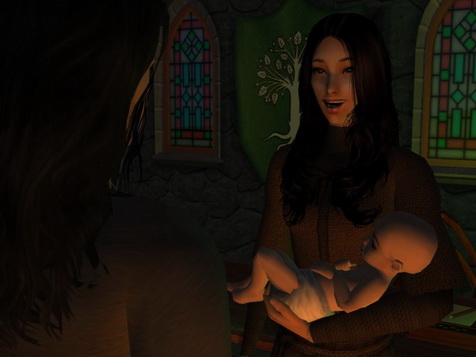
Aia skewed her shoulders straight and twisted her mouth into a smile, though her heart fluttered like a tiny bird trapped in a snare.
“E-gel-ric!”
The man smiled in return, and then Aia smiled properly in relief. He was the first man who had smiled at her – the first who had not seemed repulsed or frightened by her. It had to be he.
But the man shook his head and said gently, “No, my dear. Not Egelric. Alred.”

Aia knew “No.” This man was not Egelric either. But she should have known – Sela had said Egelric was very tall and dark and fine. This man was no taller than the elf Imin.
Her smile wilted away, and she lifted the baby onto her low shoulder so that their slope would not be so apparent. She leaned against the table, painfully balancing the weight of her body on her tailbone so that the man would not detect her crooked leg. She dared not show her weakness, though she knew she was already trapped and helpless if the men wished her ill.
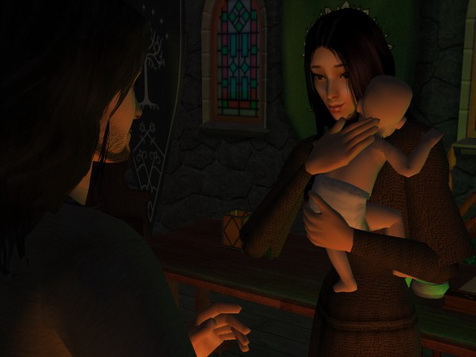
The man patted his breast and bowed slightly at the waist. “Al-red,” he repeated carefully. “Al-red.” He had the gentle voice of a mother speaking to her frightened child. She had never heard a male speak so.
Aia realized abruptly that he must have been speaking his name, and she hastened to say, “Al-red,” and bobbed her head.
The man smiled still more fondly. “And you?” he asked.
“And – you?” she repeated. She sucked on her lower lip and glanced fearfully at the door through which he had entered. Dare she ask for Egelric again?
“What’s your name?” the man asked. “Alred…” He pointed his fingers at himself and then at her. “You.”
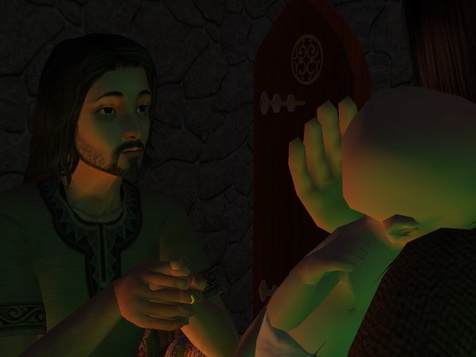
The man’s voice was soothing, but Aia felt a growing sense of dread. She was a tiny animal trapped too far from its nest at the approach of a storm. She was surrounded by sinister males in strange garments who stared at her and harried her along.
“E-gel-ric?” she asked pleadingly.

“We’ve already sent for Egelric, my dear. He will be coming.”
“E-gel-ric…”
The man coughed, crossed one arm over the other, and briskly rubbed his nose with the heel of his opposite hand. “Ah… That’s a very pretty baby you have, dear girl. Baby.”
Aia knew that word. Even in English, it made her heart pound with love and her cheeks grow pink. She whispered, “Baby,” and her mouth twisted up into a smile in spite of herself.
The man relaxed at the sight of her smile, as if he were as ill-at-ease as she.
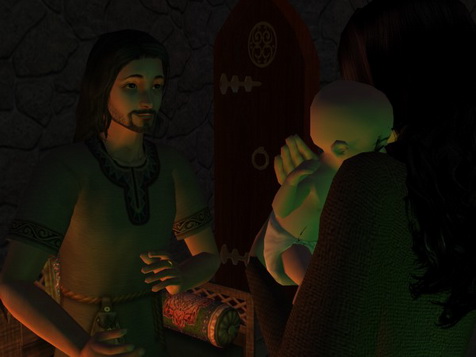
“I have had seven of the interesting creatures, myself,” the man murmured. “Though I cannot claim more than a small share of the credit. And another one is on the way!” He pressed his palms together and laughed softly.
Aia did not understand. She very nearly asked for Egelric again, but she was interrupted by a knock on the wooden door. It was no more than a soft tapping, like a spring rain, but it stunned Aia like the first crack of thunder commencing a storm.
She whimpered, “Egelric…” but hopelessly now. She was already shifting all her weight onto her good leg, already sliding her tailbone along the surface of the table.
The man Alred spoke a mild word or two, and the door swung open gently, as if a warm spring breeze were sneaking in – but behind it was a howling storm.

Aia squealed and tried to twist away, but she was inside the stone-walled tower of the men, and there were no doors behind her. She could not even fold her crooked leg beneath her and fling herself onto the floor at his feet, for fear of hurting the baby.
She was cornered, trapped, and doomed. The men were in league with the great lords of the elves, and Aia had been caught out on the night of the ban.
The elf’s eyebrows lowered in cold outrage, darkening his scowl like the great summer storms that made a nighttime out of the afternoon.
“This elf shall stand in my presence and be silent,” he growled.

Aia’s wailing stopped as suddenly as if he had willed it with his magic. Perhaps he had: perhaps his magic was so great that the world bent to his whims. Even from a distance Aia had felt the tingling, scalp-prickling dread of him. Standing in his presence she was thrashed bare by his rough winds and crushed to quivering muteness beneath his black sky.
Then the man spoke – gently still, though she had expected him to sneer now that his trick had been revealed. “My dear, this is my friend Osh, and you may explain to him how we may be of help to you.”

The elf spoke in hushed agitation to the man, but Aia had heard nothing beyond the name. This was the Lord Osh, the mighty, mysterious Second of the Khór, whose name and nature were Shadow.
But everyone knew the Lord Osh had been banished. Perhaps it was not the men who were in league with the lords, but the Lord Osh in league with the men.
“What elf is this?” Lord Osh asked coldly.
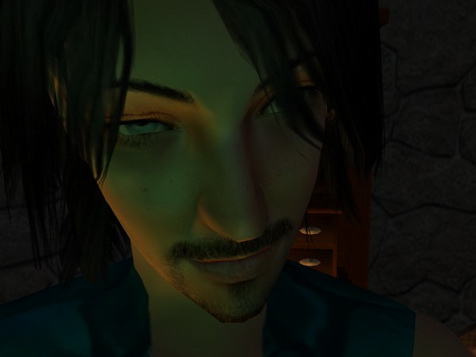
His language was hers, but he spoke his consonants with scintillating precision, and his vowels rang clear like the chimes of perfect bells. She knew her own speech would strike him as the grunting of a frog.
“Aia,” she quavered.
The baby was twisting in her arms, trying to get a proper look at this new personage.
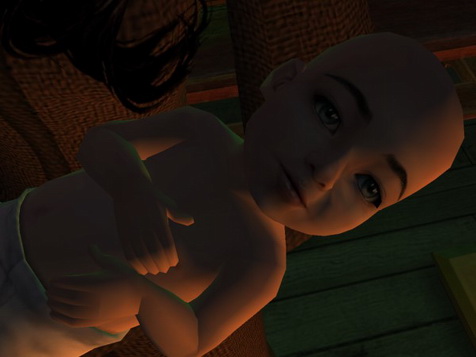
Aia cupped her palm over his face, out of some desperate, unthinking hope that the Lord Osh would simply fail to notice him if he did not see his eyes.
“Aia? What Aia?” the Lord Osh snapped.
“Aia, daughter of the Sallama-elf, daughter of the Lima-elf,” she whimpered. “Of the village of the Nidara-elder.” She realized an instant too late she had told him where to find her family. “But they do not know I am here!” she pleaded.
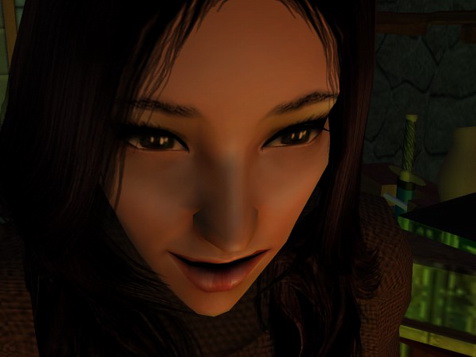
“Did I ask this elf what they knew?” he hissed.
“No, Lord…”
The man said, “Osh…”
The Lord Osh turned to him and spoke a few words, saying she knew not what, except that her name was among them.
The man murmured, “Aia…” but the Lord Osh was already speaking to her.
“Does it know its father?” he asked with a slight smile.

Aia had never learned to talk to great lords. They had never spoken to her except to mock her lameness, and she had not been expected to reply. In her haste, she thoughtlessly said, “The poet Khummirr, Lord.”
Osh’s face flushed dark, tinted crimson and purple by the fire and the green light.
Aia knew she ought to squint up her eyes, turn her face away, clutch the baby to her breast, and protect herself from the slap or kick or shove she had earned with her presumption – but she could not look away.

Her neck was stiff with terror, her body paralyzed into unnatural straightness, but the smoldering steadiness of her eyes was all due to pride in her father, though she had known him only through his songs.
After a moment, Osh relaxed his tense shoulders and arms and merely said, “I misunderstood. I forget that the kisór use our word ‘poetry’ to mean ‘the farting of dogs.’”
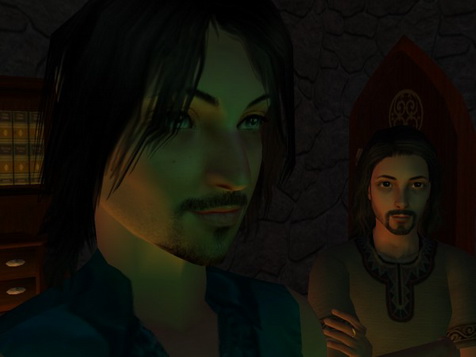
He paused to let this insult wash over her, but Aia’s heart soaked up every drop of it and swelled.
“What does this elf presume to want with the man Egelric?” he asked. “What is this baby? I wish to see it.”
He held out his hands.
Aia saw she had no choice. Her sister had liked to say that one always had a choice – that at the very least, so long as one lived, one could always choose to die. But Aia’s many choices were only thorn-choked paths leading to the same end.
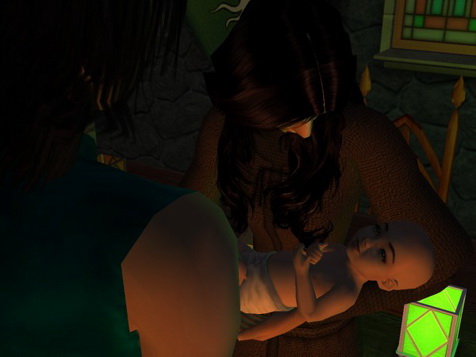
The Lord Osh would take the baby, and he would know the baby was not an elf, and Aia would never see him again. She might choose to die, but she could not make that choice for another. She could not take the baby with her – neither in life nor in death – so she would have to let them take him away from her. They would give him what she could not.
Aia tried to hold out the baby, but at her first movement her painfully composed limbs sprang wildly free: her shoulder plunged, her arm dropped, her back twisted, and her crooked leg crumpled beneath her. Osh did not take the baby so much as catch him.
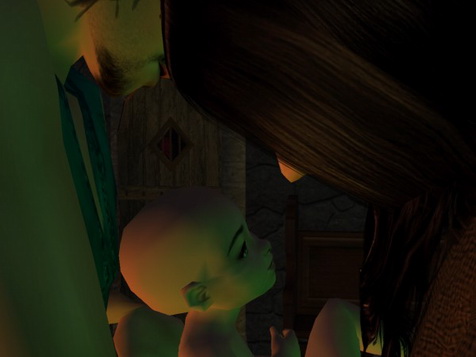
“What is this?” he cried as he snatched up the child, though he scarcely glanced at it. “This elf is crippled!”
“Yes, Lord,” Aia sobbed. She fought back the urge to lift her hand and hold on to the baby, but his pink foot was only inches from her lips, and she feared she could not long resist a last kiss.
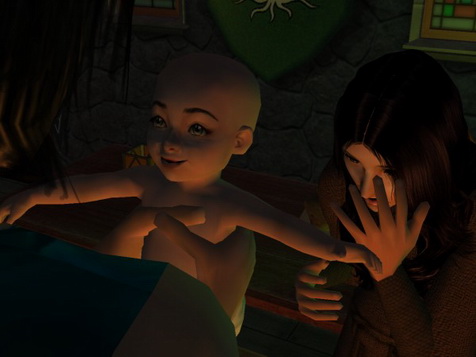
“What happened to it?” the Lord Osh demanded. “What is this farce?”
“I was born this way, Lord,” Aia said miserably. She had no choice but to tell the truth, of which there was only one. Her crooked and her straight feet were already far along on the path.

“Born this way!” He glanced over the baby in search of crooked limbs, but he quickly looked back at Aia. “Why was this elf allowed to live?”
“I was not, Lord, I was not,” she said softly.
Aia stared hungrily at the dangling pink foot, making it the focal point of all her life’s lonely love and longing. Now she could tell her tale even to lords – now that Sela was safe from all harm – now that Aia had lost everything she had to lose – now that she had given the baby more than she had to give.
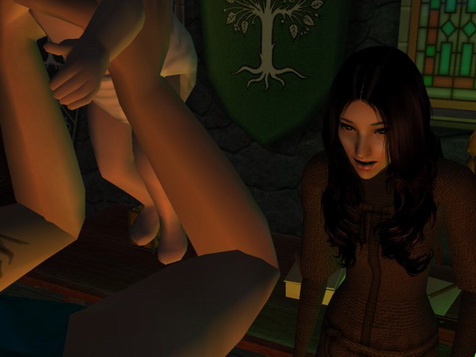
“My sister the Sela-elf came every night and every day for five days, and she fed me and nursed me.”
Perhaps the Lord Osh could have heard the velvety love and pride in her voice, but for love and pride of Sela Aia did not care. She could always choose to die, as she ought to have done eighteen winters past if Sela had not chosen life for her.
“And after five days when I was found still alive, the elders decided I was not fated to die and brought me home. And by the time they learned what my sister had done, I was too old to be killed.”
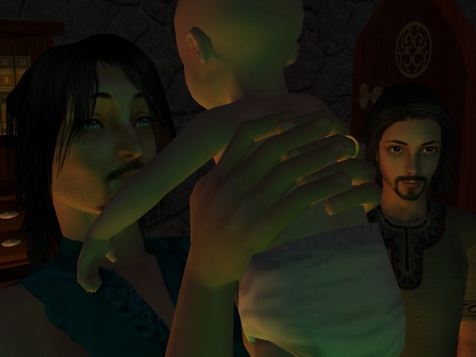
The Lord Osh only grunted, for he had begun examining the baby and seemed to have forgotten her. Soon he was exclaiming angrily in English and showing Alred the rat-bites, the rashes, and the sunken belly. Soon enough he would notice the child was no elf at all.
But Aia stared unblinking up at him, and sparks of defiance starred the nighttime blackness of her eyes. They were the eyes she had shared with Sela: the dark eyes of their father, who had survived nearly three years with a death sentence on his head, and who had stared unblinking at his killer and sang until he died.
“And so have I passed eighteen stolen winters by,” she whispered.






 But we will have lots of Cedric to look at meanwhile, and more sweat-stained Old Man Myrddin too. Whoo!
But we will have lots of Cedric to look at meanwhile, and more sweat-stained Old Man Myrddin too. Whoo!
So, somehow this Aia turned out about 180 degrees away from the meek, gentle, humble, Lena-like Aia I had planned. A good reason for me not to take too many pictures too far ahead of the story. I just hope I can use the pictures I already took with her.